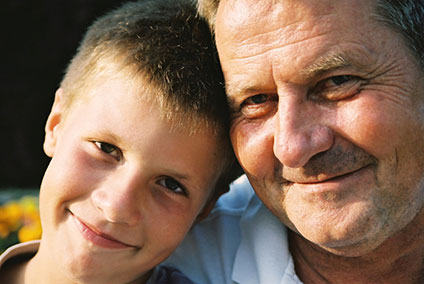 While becoming pregnant and delivering a healthy baby is everyone’s goal for treatment, it is by no means the end of the journey. All parents starting out face challenging situations and decisions, only a few of which are unique to parents who started their families with the use of donor egg or donor sperm.
While becoming pregnant and delivering a healthy baby is everyone’s goal for treatment, it is by no means the end of the journey. All parents starting out face challenging situations and decisions, only a few of which are unique to parents who started their families with the use of donor egg or donor sperm.
Specifically, one of the biggest concerns we find that our patients express involves the question of disclosure. Couples should decide if, when and how to tell their child that he or she was conceived with the help of a donor. The trend for years has been that it is increasingly common to tell the child, however this is a tremendously personal decision, without a single solution that applies to every situation. “Just don’t make the decision out of fear” says Phyllis Martin, a Licensed Professional Counselor (LPC) who specializes in treating clients who are undergoing fertility treatment and those who are building their families with the help of donor egg or donor sperm.
Martin describes the most common concern she hears her clients express as “maternal rejection.” The fear that someday in the future the child may utter something to the effect of “you’re not my real mother!” or “I wish you weren’t my mother!” is nearly a universal concern with her donor egg patients. (Same is true with donor sperm.) What she finds helps to alleviate these concerns is to explain to the mom-to-be that yes, something like that may likely happen. However, it is not an expression about genetics, rather a typical teen expression when he/she is angry and is pushing boundaries. In fact she states her clients often recall expressing similar notions to their own mothers when they were teens themselves!
Should you decide not to disclose, Ms. Martin advises to be ready with an answer should the child find out inadvertently. “Don’t get caught off guard”. She notes that research clearly indicates that the older the child is when they find out, the harder it is for them to accept and understand. “Even though an older child or adult is able to understand the concept of donor egg or donor sperm, finding out at a later stage affects them more powerfully and negatively. It gets worse the older they are when they find out. They feel betrayed, angry and frustrated. They become unsure of where they fit in in the world.”
 Along with being prepared to answer questions should they find out, Ms. Martin also advises that if you’re not planning on telling the child, you should not tell anyone else “Because once you have shared this information, you cannot control it and no one else should be telling your child his/her conception process but you.”
Along with being prepared to answer questions should they find out, Ms. Martin also advises that if you’re not planning on telling the child, you should not tell anyone else “Because once you have shared this information, you cannot control it and no one else should be telling your child his/her conception process but you.”
The research leans strongly in the direction that disclosing early and making it part of the child’s story from the beginning is a healthy approach. Ms. Martin admits that talking to young children about where they came from is not always comfortable, but she assures us that the more you do talk about it, the more comfortable you will become with the words and the concept.
A key point in her advice about how and when to bring up the subject was to begin early and repeat often. You can start practicing to tell the story while the child is still an infant and can’t understand the words. This gives you time to get the words right so that you say just what you mean. More importantly, starting to tell the story to the child while he is still an infant gives you time to become comfortable telling the story yourself. Ms. Martin notes “It’s important to separate the pain (your story) from the gratitude (their story.) “In fact”, she says “If a mom or dad isn’t able to do that, it’s a red flag that it’s time to seek counseling to help them process their emotions.”
So, how might that conversation go? Here are a few words or sentiments that might help get you started:
- “We are so happy we have you. We were looking for you everywhere!”
- “We are so happy the doctor could help us because mommy needed help to have you.”
- “We were so sad because we thought you would never arrive, but then we found a doctor and a special person called a donor who helped us have you and that made us so happy!”
- “The day you were born was the happiest day of our lives. We had been waiting for you and hoping for you for so long.”
- “A nice ‘helper’ called a donor helped us have you.” Explain that a donor is someone who gives very important, very special things.
- “An egg is a very special cell. Everyone in the world starts out in the same way: they need a special cell from the woman and a special cell from the man. Mommy got the special cell she needed to have you from a nice woman who helped her. She is called a donor.”
- Use the correct terms from the get-go. The child won’t think that words such as “egg” or “sperm” are anything to be embarrassed about if you’re not embarrassed. They will take their cues from you. If you are uncomfortable, they will understand this is something they shouldn’t talk about. This is another reason to start practicing saying the words early, and to incorporate it as part of their story, and the story of your family.
- Most importantly, normalize! There are all kinds of ways that families come about: Adoption, donor egg, donor sperm, unassisted conception, etc. “Sometimes mommies and daddies have to go to the doctor to get help having a baby, sometimes the baby comes on its own. Sometimes mommies and daddies bring their babies home from the hospital, sometimes they bring their babies home from another country or an adoption agency.” There are many types of families in the world but they are all about love and belonging.
Remember things to do:
- Practice telling the story.
- Focus on the positives: How much you wanted him/her and how grateful you are that you have him/her now.
- Consider seeking counseling to help you process these difficult and complex emotions is you are unable to separate the pain (your story) from the gratitude (their story).
- Explain all the different ways families are made (adoption, donor egg, donor sperm, unassisted conception, foster families, step-families, two moms or two dads, single parent families, etc.)
- Take the lead. Some kids will ask questions, some will not so it is up to you to bring up the subject in a positive light.
- When kids do ask questions or talk about their story, encourage them to elaborate: “What do you mean?” or “What do you think?”
- Be prepared that this may come up in a scuffle, especially during the adolescent years. Remember that rebellious teenagers are a normal part of every family.
- Be open about the process. If your child sees that you embrace the fact that you have him/her because of the fertility treatment you received, they will understand it’s simply a part of his/her story.
Things to avoid:

- When considering whether or not to disclose to your child that you used a donor, avoid making your decision out of fear.
- Don’t start a sentence with “don’t”. For example: “Don’t worry, I’m still your mom.” Or “Don’t think I love you any less”.
- Don’t assume they are fine with it if they’re not talking about it. Some kids will talk and ask questions, some will not. Follow-up with them consistently, one way to do this is to wonder aloud: “I wonder if you’re really good at the guitar because your donor was too?”
- Don’t be caught off guard. Be ready for questions at any age, even if you chose not to disclose the fact that a donor was used. It is possible the child could find out inadvertently, so you should be ready with an answer.
- Don’t take it personally when a child/teen expresses hurtful sentiments that could be taken as rejection of you as a mother. Such painful exchanges are not at all unique to donor families and are a normal part of the developmental process of any teen. Let them know you heard them but that you disagree: “I’m sorry to hear that you feel that way. I’m very glad I’m your mom, even on days like today.”
- Don’t refer to an egg donor in any way as maternal or having anything to do with mothering. A donor is a donor. She should not be referred to as a birth mother, your first mother, your real mother, your genetic mother, etc. Donor has to do with genes, whereas a mother has to do with love and action. In her counseling sessions with donor moms, and women who are considering using donor egg, Phyllis Martin, LPC often reminds them that “Motherhood is in the doing.”
Hearing the story of everything you went through to have your son or daughter lets them know from the very beginning that they are special and cherished. Knowing how much they are loved and wanted is something that every child needs to hear, regardless of the particular circumstances around how they were conceived. All families are born out of love…The rest is just details.







 While becoming pregnant and delivering a healthy baby is everyone’s goal for treatment, it is by no means the end of the journey. All parents starting out face challenging situations and decisions, only a few of which are unique to parents who started their families with the use of donor egg or donor sperm.
While becoming pregnant and delivering a healthy baby is everyone’s goal for treatment, it is by no means the end of the journey. All parents starting out face challenging situations and decisions, only a few of which are unique to parents who started their families with the use of donor egg or donor sperm. Along with being prepared to answer questions should they find out, Ms. Martin also advises that if you’re not planning on telling the child, you should not tell anyone else “Because once you have shared this information, you cannot control it and no one else should be telling your child his/her conception process but you.”
Along with being prepared to answer questions should they find out, Ms. Martin also advises that if you’re not planning on telling the child, you should not tell anyone else “Because once you have shared this information, you cannot control it and no one else should be telling your child his/her conception process but you.”